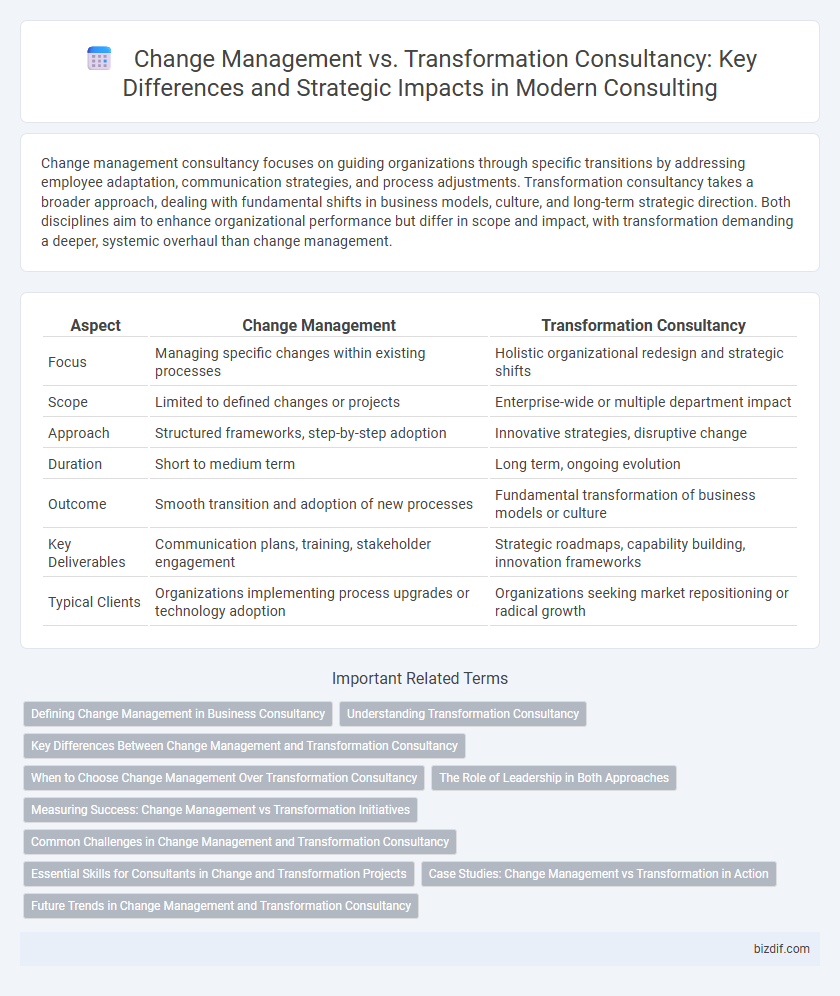Change management consultancy focuses on guiding organizations through specific transitions by addressing employee adaptation, communication strategies, and process adjustments. Transformation consultancy takes a broader approach, dealing with fundamental shifts in business models, culture, and long-term strategic direction. Both disciplines aim to enhance organizational performance but differ in scope and impact, with transformation demanding a deeper, systemic overhaul than change management.
Table of Comparison
| Aspect | Change Management | Transformation Consultancy |
|---|---|---|
| Focus | Managing specific changes within existing processes | Holistic organizational redesign and strategic shifts |
| Scope | Limited to defined changes or projects | Enterprise-wide or multiple department impact |
| Approach | Structured frameworks, step-by-step adoption | Innovative strategies, disruptive change |
| Duration | Short to medium term | Long term, ongoing evolution |
| Outcome | Smooth transition and adoption of new processes | Fundamental transformation of business models or culture |
| Key Deliverables | Communication plans, training, stakeholder engagement | Strategic roadmaps, capability building, innovation frameworks |
| Typical Clients | Organizations implementing process upgrades or technology adoption | Organizations seeking market repositioning or radical growth |
Defining Change Management in Business Consultancy
Change management in business consultancy involves structured approaches to transitioning individuals, teams, and organizations from a current state to a desired future state, ensuring minimal disruption and sustained adoption of new processes or technologies. It emphasizes managing employee resistance, communication strategies, and training to foster engagement and effective implementation. This contrasts with transformation consultancy, which addresses fundamental shifts in business models, culture, and strategy beyond incremental change management practices.
Understanding Transformation Consultancy
Transformation consultancy focuses on guiding organizations through comprehensive and strategic shifts that redefine business models, culture, and processes to achieve long-term growth. Unlike change management, which addresses specific project changes and employee adaptation, transformation consultancy involves holistic planning, innovation integration, and value creation across the entire enterprise. Key expertise includes digital transformation, organizational redesign, and sustainable competitive advantage initiatives.
Key Differences Between Change Management and Transformation Consultancy
Change management focuses on guiding individuals and teams through specific organizational changes using structured processes and communication strategies to minimize resistance and ensure smooth adoption. Transformation consultancy involves a comprehensive overhaul of an organization's core operations, culture, and business models to drive long-term strategic growth and innovation at scale. Key differences include change management's emphasis on tactical execution for discrete projects, whereas transformation consultancy addresses systemic, organization-wide evolution with a broader scope and impact.
When to Choose Change Management Over Transformation Consultancy
Choose change management consultancy when addressing specific organizational shifts that require employee adaptation, process adjustments, or cultural alignment within existing frameworks. Change management is ideal for incremental changes such as system upgrades, policy implementation, or restructuring, ensuring minimal disruption and sustained productivity. Transformation consultancy suits broader, strategic overhauls involving fundamental business model changes, digital innovation, or cultural reinvention beyond routine adaptation.
The Role of Leadership in Both Approaches
Leadership drives change management by guiding teams through structured adjustments, ensuring clear communication, stakeholder alignment, and minimizing resistance in incremental shifts. In transformation consultancy, leadership plays a critical role in envisioning and steering large-scale cultural and operational shifts, fostering innovation and agility across the organization. Effective leaders balance short-term change execution with long-term transformation vision to sustain competitive advantage and organizational growth.
Measuring Success: Change Management vs Transformation Initiatives
Measuring success in change management often involves tracking employee adoption rates, process improvements, and short-term project milestones using tools like KPIs and employee feedback surveys. Transformation consultancy evaluates broader organizational impact by assessing long-term strategic alignment, cultural shifts, and financial performance metrics such as revenue growth and market expansion. Combining quantitative data with qualitative insights ensures a comprehensive understanding of both change initiatives and transformational outcomes.
Common Challenges in Change Management and Transformation Consultancy
Change management and transformation consultancy both address organizational shifts but face common challenges such as employee resistance, communication gaps, and aligning stakeholder expectations. Effective change initiatives require overcoming cultural barriers and maintaining engagement throughout the transition process. Navigating these challenges demands strategic planning, clear leadership, and continuous adaptation to evolving organizational dynamics.
Essential Skills for Consultants in Change and Transformation Projects
Effective change management consultants excel in stakeholder communication, risk assessment, and adaptive leadership to ensure smooth transitions during organizational shifts. Transformation consultancy demands advanced strategic thinking, innovation facilitation, and comprehensive business acumen to drive large-scale, sustainable change. Mastery in data analysis and emotional intelligence underpins success across both domains, enabling consultants to align initiatives with organizational goals and culture.
Case Studies: Change Management vs Transformation in Action
Case studies in consultancy reveal distinct approaches between change management and transformation, highlighting different scales and depths of organizational evolution. Change management focuses on guiding incremental adjustments within existing frameworks, often using structured methodologies like ADKAR or Kotter's 8-Step Process to ensure smooth transitions. Transformation consultancy addresses comprehensive shifts in business models or culture, emphasizing strategic realignment and innovation through case studies involving digital transformation or enterprise-wide restructuring.
Future Trends in Change Management and Transformation Consultancy
Change management consultancy increasingly integrates AI-driven analytics and agile methodologies to enhance organizational adaptability, while transformation consultancy focuses on holistic digital overhaul and culture shifts to future-proof businesses. Future trends emphasize the convergence of technology adoption, continuous learning frameworks, and resilience-building strategies to navigate disruptive market dynamics effectively. Embracing these advances enables consultancies to deliver scalable, data-informed solutions that align with evolving stakeholder expectations and competitive landscapes.
Change management vs Transformation consultancy Infographic

 bizdif.com
bizdif.com